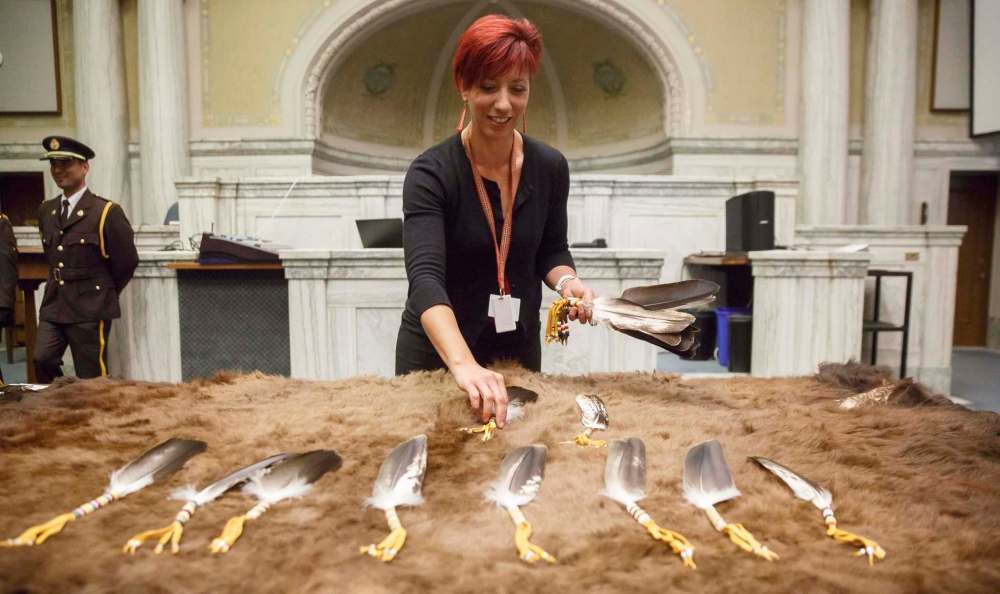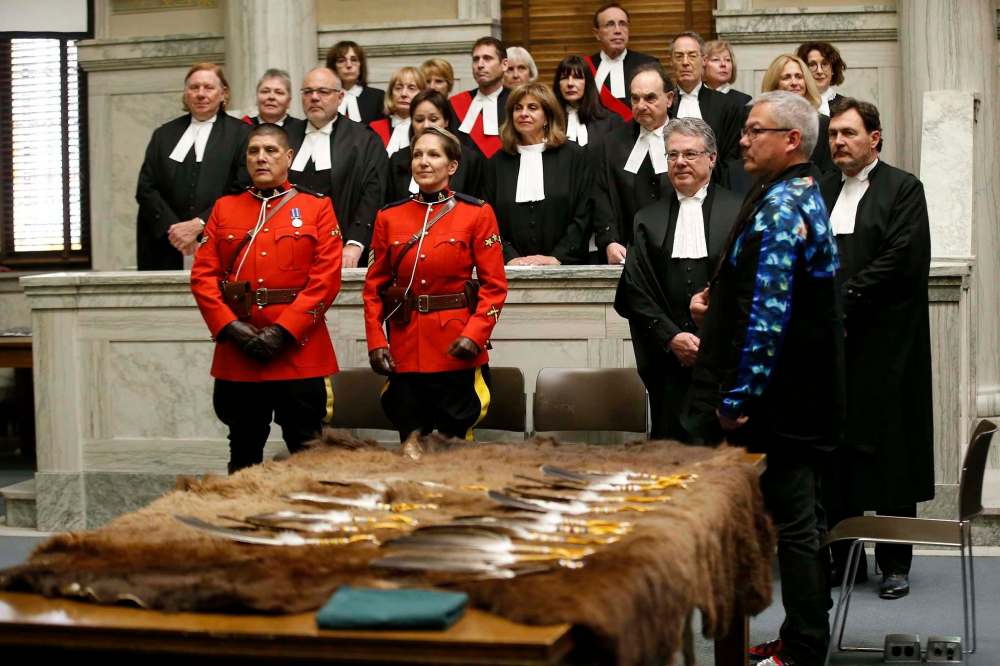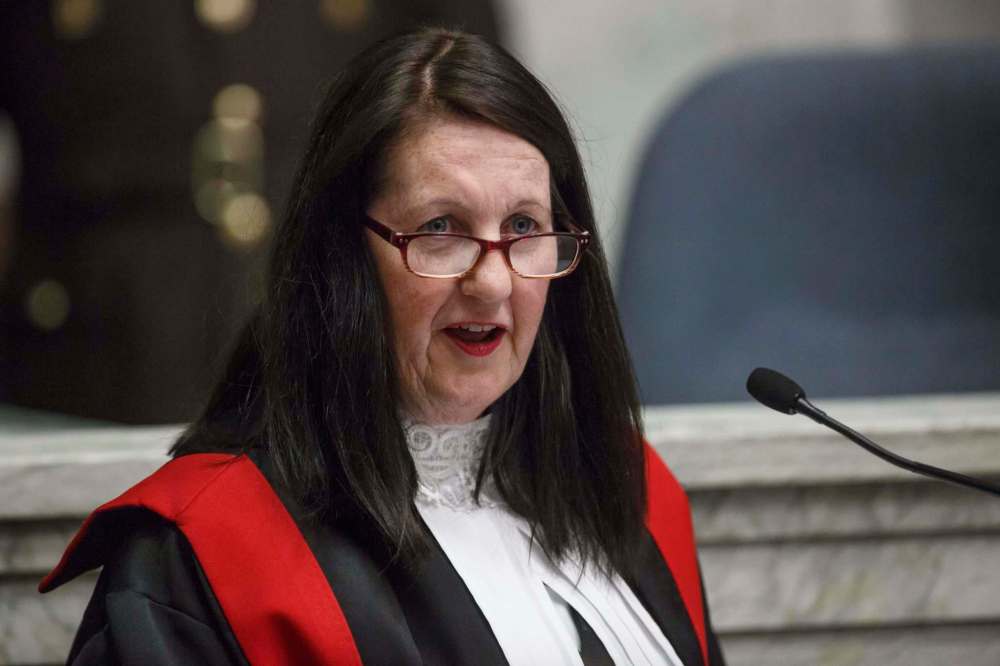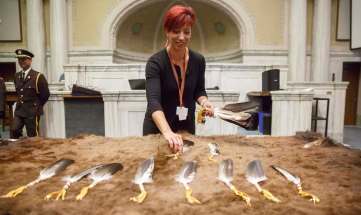Eagle feathers ‘an implement of justice in Manitoba’
Read this article for free:
or
Already have an account? Log in here »
To continue reading, please subscribe:
Monthly Digital Subscription
$0 for the first 4 weeks*
- Enjoy unlimited reading on winnipegfreepress.com
- Read the E-Edition, our digital replica newspaper
- Access News Break, our award-winning app
- Play interactive puzzles
*No charge for 4 weeks then price increases to the regular rate of $19.00 plus GST every four weeks. Offer available to new and qualified returning subscribers only. Cancel any time.
Monthly Digital Subscription
$4.75/week*
- Enjoy unlimited reading on winnipegfreepress.com
- Read the E-Edition, our digital replica newspaper
- Access News Break, our award-winning app
- Play interactive puzzles
*Billed as $19 plus GST every four weeks. Cancel any time.
To continue reading, please subscribe:
Add Free Press access to your Brandon Sun subscription for only an additional
$1 for the first 4 weeks*
*Your next subscription payment will increase by $1.00 and you will be charged $16.99 plus GST for four weeks. After four weeks, your payment will increase to $23.99 plus GST every four weeks.
Read unlimited articles for free today:
or
Already have an account? Log in here »
Hey there, time traveller!
This article was published 26/09/2019 (2267 days ago), so information in it may no longer be current.
An Indigenous symbol of truth is now an official way to testify in Manitoba’s courts, as the justice system continues to grapple with its role in reconciliation.
Manitobans can testify by holding an eagle feather, rather than swearing on the Bible or simply stating their promise to tell the truth in court. The eagle feather has already been accepted in some court trials for several months, but with the Supreme Court of Canada’s visit casting a national spotlight on Manitoba courts this week, a joint session between the provincial court and the Manitoba Court of Queen’s Bench was called Thursday to officially recognize it.

Forty-five eagle feathers were blessed and gifted to Manitoba courts during a sunrise smudging ceremony at The Forks Thursday morning, and a courthouse presentation Thursday afternoon brought together all nine visiting Supreme Court justices and every sitting judge in Winnipeg. Indigenous drummers were welcomed for a first-of-its-kind courtroom ceremony in which chief judges promised their work isn’t done when it comes to working with Indigenous people and making room for culturally appropriate practices.
Barry French, a longtime Indigenous advocate and one of the individuals who gifted eagle feathers to the court, emphasized the progress the move represents in Manitoba’s court process.
“In our culture, justice is swift, but it’s consensual. It’s something built by consensus, we talk about it,” he said. “Justice today is slow and ponderous.”
“In the past, the courts typically asked that we walk behind them, never to lead them or to walk beside them. I think that today, the whole community is going to be walking beside the court on its journey towards justice,” French added.
“We were asked to walk beside, and we accept,” he said, to a round of applause.

Consultations to allow eagle feathers in court began two years ago. They will be used in all court locations across the province when witnesses testify and give evidence. In Indigenous cultures, because of the eagle’s ability to fly to great heights, “in proximity to heavens,” its feathers are believed to be a “messenger of meaning,” from our maker, said elder Ed Azure.
Eagle feathers are traditionally used in headdresses and given as adornments to award individuals for their bravery. More recently, Azure said, they’ve been used in healing circles to signal that someone is speaking the truth. “And now it’s an implement of justice in Manitoba,” he said.

The inclusion of the eagle feather is a step “to creating a more inclusive and relevant” justice system, Provincial Court Chief Judge Margaret Wiebe said.
“We hope it is understood that the courts are committed to reconciliation and the court acknowledges its responsibility to find a meaningful way to include Indigenous people in the court system and to build their confidence in the administration of justice.
Courts across the country are still dealing with how they can work on reconciliation while upholding the law, Court of Queen’s Bench Chief Justice Glenn Joyal said.
“In that sense, the court may be an imperfect instrument of reconciliation, however, as limited as we may be, we have no choice but to accept the moral challenge and the legal responsibility of reconciliation.”
katie.may@freepress.mb.ca
Twitter: @thatkatiemay

Katie May is a general-assignment reporter for the Free Press.
Our newsroom depends on a growing audience of readers to power our journalism. If you are not a paid reader, please consider becoming a subscriber.
Our newsroom depends on its audience of readers to power our journalism. Thank you for your support.












